

COURSE DESCRIPTION:
The Astrophysics Seminar (ASTR 6000) is a topical seminar, offered each semester on a different scientific subject, related to the astrophysics ``discipline courses''. This semester, in connection with the graduate courses ASTR 5740 Interstellar Astrophysics and ASTR 5770 Cosmology, the seminar will be on the topic Galaxy Formation, including both theoretical and observational issues.
The theoretical studies will include discussions of the Cold Dark Matter (CDM) paradigm for formation of large-scale structure, formation of the first stars and galactic objects, and the "feedback" of radiation and energy on the intergalactic medium (IGM).
The observational studies will include studies of the high-redshift universe (z = 2 - 30) at multiple wavelength bands, including infrared, sub-millimeter, and UV/optical. We will discuss probes of large-scale structure, dark matter, baryonic matter, and reionization of the IGM. We will also discuss observations and instrumentation on current and future NASA/ESA space-borne telescopes. Check out the following links:
-
Next Generation Space Telescope (NGST)
- Space Infrared Telescope Facility (SIRTF)
-
Herschel/FIRST Sub-Millimeter Mission
SEMINAR TOPICS AND READING:
Jan. 17 - Background Lecture 1 on Galaxy Formation (Shull)
Jan. 24 - Background Lecture 2 on Galaxy Formation (Shull)
Jan. 31 - History of Star Formation & Hubble Deep Field (Baker & Hearty)
Feb. 7 - Cosmic Structure Formation (Neyrinck & Earle)
Feb. 14 - Press-Schechter Theory (Jensen & Keeney)
Feb. 21 - SN Feedback and Clusters of Galaxies (McEntaffer & ...)
Feb. 28 -
Mar. 7 -
Mar. 14 -
Mar. 21 -
Mar. 28 - No seminar (Spring Break)
Apr. 4 -
Apr. 11 -
Apr. 18 -
Apr. 25 -
May 2 -
Last modified Nov. 29, 2001 by J.M. Shull